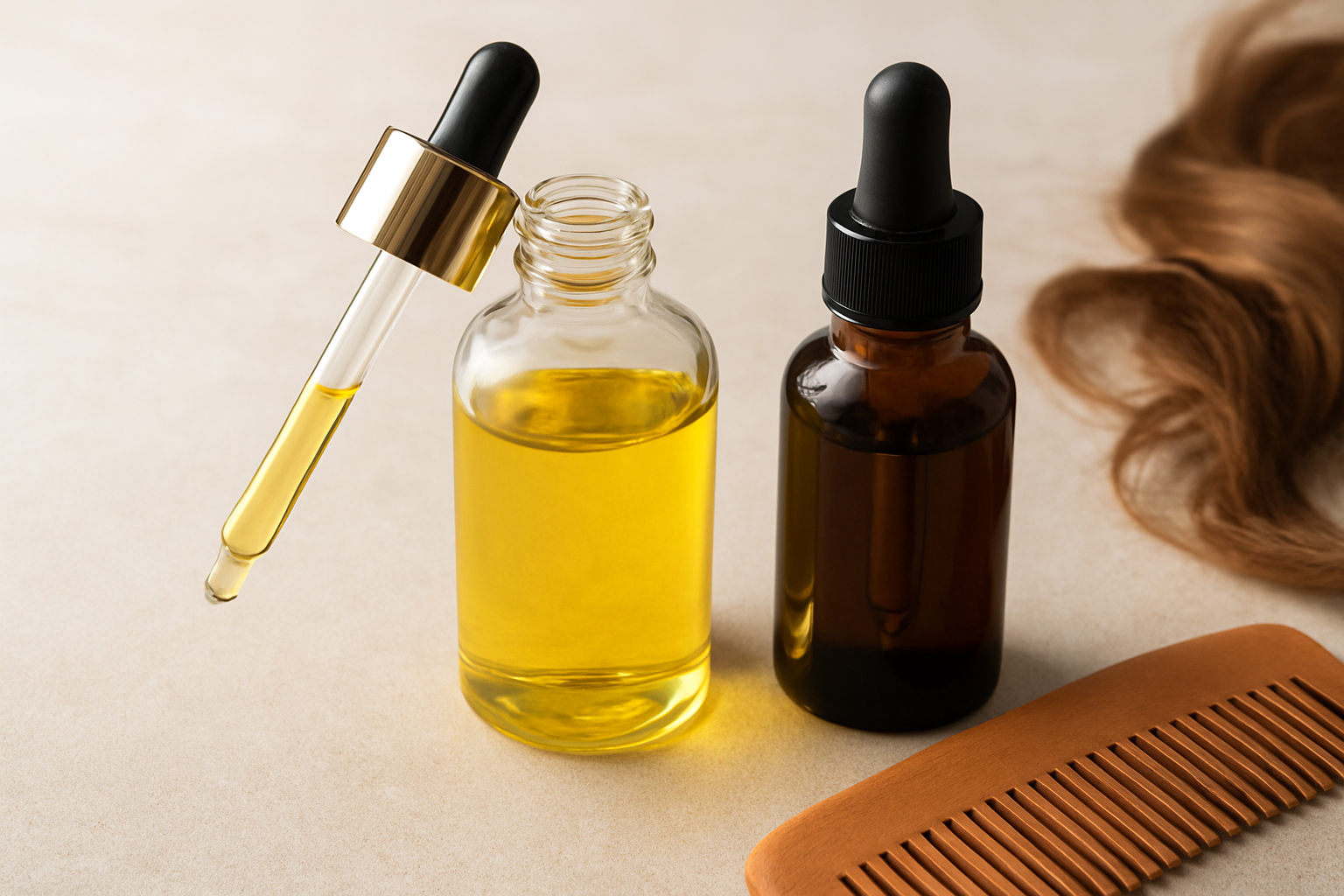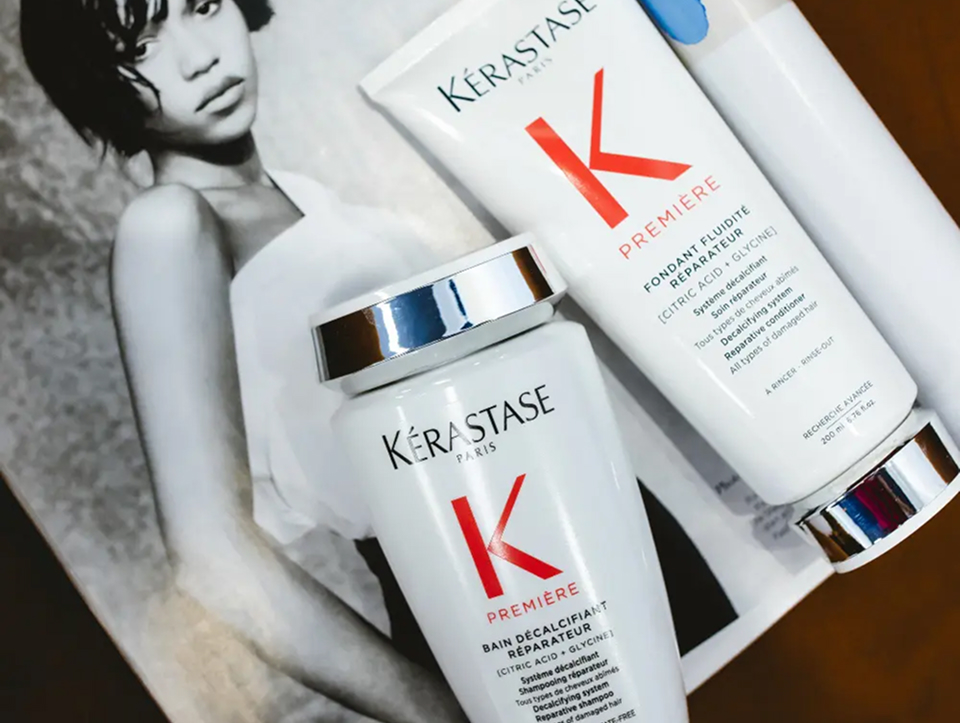How many times have you walked down the beauty aisle and seen scalp serums and hair oils promising healthier, shinier hair?
Here’s the truth: scalp serum and hair oil aren’t the same thing.
In the scalp serum vs. hair oil debate, the difference is simple: serums target your scalp health (such as flakes, oiliness, or thinning), while oils focus on nourishing your hair strands for shine, softness, and protection.
Using the wrong product in the wrong place can leave you with greasy roots, weighed-down strands, or missed opportunities for healthier growth.
That’s why in this guide, we’ll break down scalp serum vs hair oil, show you when to use each, and even explain how you can combine them for the best results in your routine.
Quick Comparison: Scalp Serum vs Hair Oil
| Feature | Scalp Serum | Hair Oil |
| Texture | Lightweight, fast-absorbing | Rich, slow-absorbing |
| Purpose | Targets scalp concerns (flakes, oil balance, thinning) | Nourishes and hydrates hair strands |
| Best For | Oily, flaky, itchy, or thinning scalp | Dry, frizzy, damaged hair or dry scalp |
| Application | Leave-in, post-wash on scalp | Pre-wash mask or ends-only styling |
| Pros | Non-greasy, active-rich, scalp-focused | Deeply moisturizing, restores shine |
| Cons | Doesn’t condition strands much | It can weigh down fine hair if overused |
🌟 Tip: Think of scalp serum as skincare for roots and oil as moisturizer for strands.
What is a Scalp Serum?
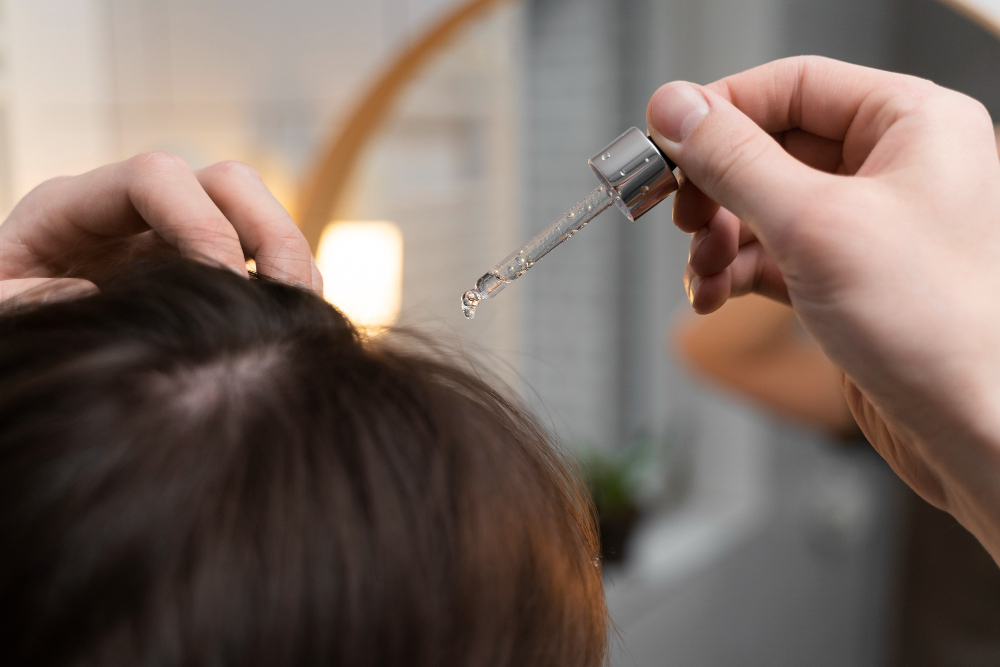
Scalp serums are leave-in treatments designed for your scalp. They contain active ingredients that address issues such as dandruff, irritation, excess oil, or thinning hair.
- Niacinamide (Vitamin B3): Reduces inflammation and boosts scalp circulation.
- Salicylic Acid: Exfoliates the scalp and reduces flakes.
- Rosemary Extract: Supports hair growth and reduces itchiness.
👉 Learn more in our guide: What is a Scalp Serum? Additionally, discover which option is better: a salon or an at-home hot oil treatment.
🌟 Tip: Apply scalp serum post-wash to clean, damp hair; this ensures the actives penetrate effectively.
What is Hair Oil?

Compared to scap serums, hair oils are nutrient-rich treatments that coat, condition, and protect your hair strands. They don’t target root concerns, but deliver shine, strength, and softness.
- Argan Oil (rich in fatty acids): Restores elasticity and hydration.
- Coconut Oil: Proven to reduce protein loss in hair.
- Vitamin E (antioxidant): Protects strands from oxidative damage.
👉 Read: How to Use Hair Oil Properly and our 7-Day Scalp Detox Routine
🌟 Tip: Use hair oil as a pre-shampoo mask or on mid-lengths to ends after styling for added shine.
When to Use Scalp Serum vs Hair Oil
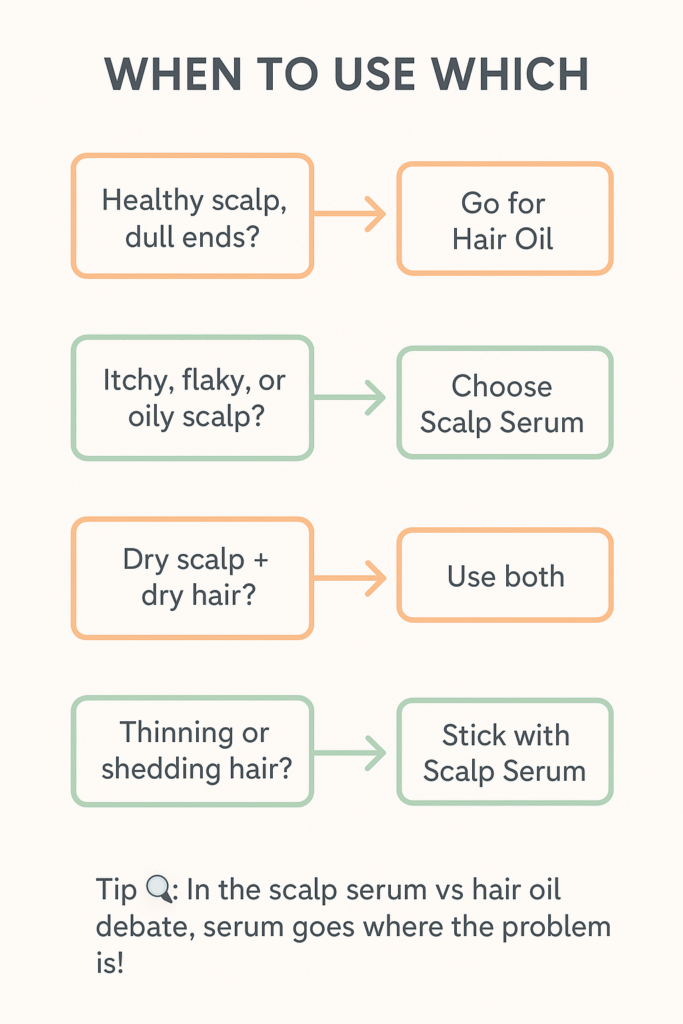
Healthy Scalp, Dull Ends: Go for Hair Oil
If you have a balanced scalp with no itch, no flakes, and no oiliness, but your strands appear dull, frizzy, or dry, hair oil is what you need. Oils like argan, jojoba, or coconut create a protective layer around the hair shaft, locking in shine and smoothness.
🌟 Tip: Focus on mid-lengths to ends, and avoid roots to prevent greasiness.
Itchy, Flaky, or Oily Scalp: Choose Scalp Serum
If you struggle with dandruff, buildup, or an oily scalp that never feels clean, a scalp serum containing actives like salicylic acid or niacinamide is most effective. It targets the root of the issue without adding heaviness.
🌟 Tip: Apply post-wash so the ingredients can actually absorb into the scalp.
Dry Scalp + Dry Hair: Use Both
When your scalp feels tight or flaky, and your strands are dry, you don’t have to choose between them; combine them. Use a scalp serum after washing to rehydrate and balance your roots, then apply a hair oil as a pre-shampoo treatment or as a finishing touch on the ends.
🌟 Tip: Try overnight oiling on the lengths and scalp serum in the morning for a 24-hour moisture cycle.
Thinning or Shedding Hair: Stick with Scalp Serum
For early signs of thinning, shedding, or reduced density, scalp serums with rosemary extract, peptides, or niacinamide are more effective than oils. While oils can condition and protect, they won’t stimulate or support follicles the way actives can.
🌟 Tip: Consistency matters. Apply your serum regularly (2–3 times per week or as directed) for visible results.
🌿 Final Tip: In the scalp serum vs hair oil debate, serum goes where the problem is. Treat your scalp with serum, your strands with oil.
Scalp Serum vs Hair Oil Ingredients
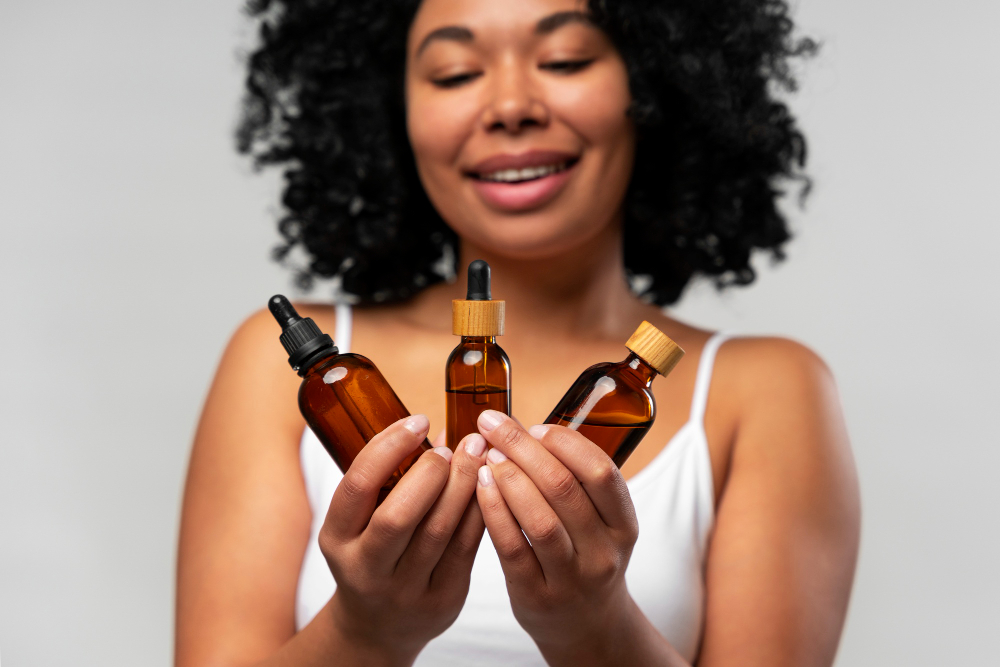
Scalp Serum Actives
Scalp serums usually pack lightweight, science-backed ingredients that target the root cause of scalp issues.
- Niacinamide → Strengthens your scalp barrier, improves blood flow, and can help with overall follicle health.
- Salicylic Acid → A gentle exfoliant that clears away buildup, oil, and flakes, making room for healthier growth.
- Rosemary Extract → Known for stimulating circulation around hair follicles, which may encourage thicker, fuller strands.
- Peptides → Support follicle strength and resilience, making your scalp environment healthier for growth.
👉 Related read: Scalp Spa or Hair Spa: Which Do You Need?
Hair Oil Nutrients
Hair oils focus more on nourishing and protecting the hair shaft, keeping strands smooth, shiny, and strong.
- Argan & Jojoba Oils → Deeply hydrate, reduce frizz, and add a natural glossy finish.
- Coconut Oil → Protects against protein loss, making it especially helpful if your hair feels weak or brittle.
- Vitamin E → A powerful antioxidant that shields your hair from free-radical damage (think pollution, UV rays, and heat styling).
👉 Explore: Scalp Oil Treatment Guide
Hair Oil vs Scalp Serum: How To Use and Benefits
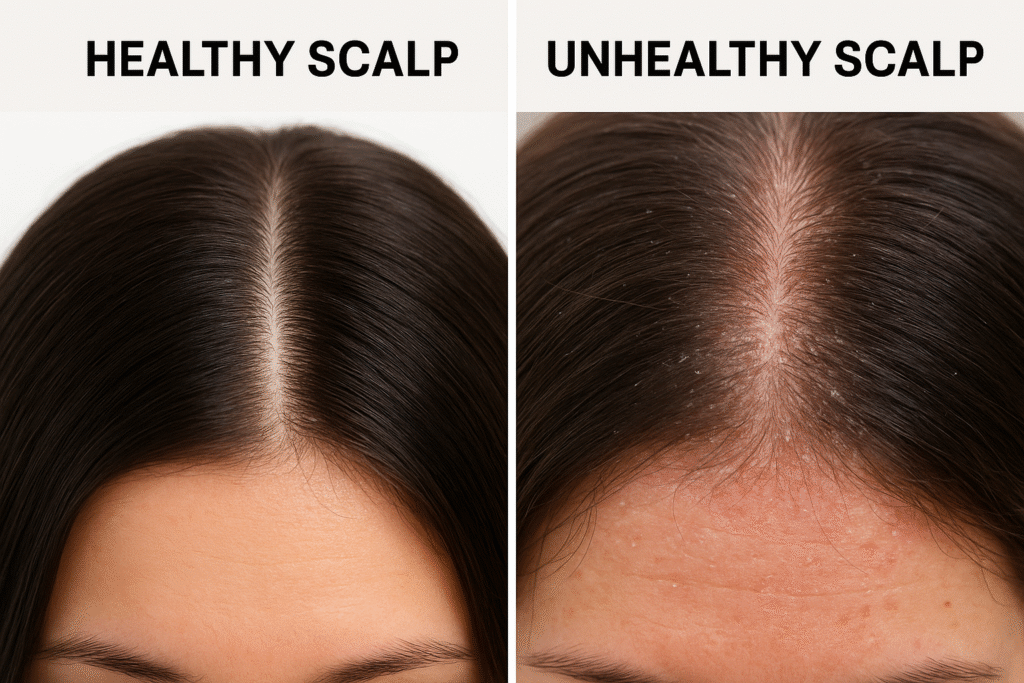
How to Layer Scalp Serum and Hair Oil
- Wash Day Routine: Shampoo → apply scalp serum → dry and style → finish ends with a touch of oil.
- Night Routine: Apply hair oil overnight on mid-lengths → wash in the morning → scalp serum post-shampoo.
- Avoid applying heavy oils directly after acid-based serums, as they may block absorption.
👉 For deeper hydration: Hydrating Hair Treatment
✨Tip: Fine hair? Use lightweight oils, such as grapeseed or squalane, to prevent greasiness.
Benefits of Using Both
Using scalp serum and hair oil together can create a balanced routine:
- Serum → targets scalp environment for healthy growth.
- Oil → locks in shine and prevents dryness.
👉 Try: Hot Oil Treatments and Their Benefits
✨Tip: Think of it as a skincare serum for the roots, moisturizer for the strands.
Which Should You Choose?
If your scalp is causing you trouble (itching, flakes, thinning), consider reaching for a scalp serum. If your strands need love (they’re dry, frizzy, or lifeless), opt for a hair oil. And if you want the best of both worlds? Layer them for a complete routine.
👉 Explore more about scalp and hair treatments at Haste Hair or book a consultation to personalize your care plan.
FAQ
Can I use scalp serum and hair oil together?
Yes, you can use both as long as you apply them correctly: serum to the scalp and oil to the strands. Just remember to layer scalp serum first so it can absorb without interference.
How often should I apply scalp serum vs hair oil?
Most scalp serums work best 2–3 times per week, while hair oils can be used as a pre-wash treatment or a light finishing touch whenever your ends feel dry. Adjust your routine according to your hair type and specific needs.
Which is better for hair growth: scalp serum or hair oil?
Scalp serum is more effective for stimulating growth since it contains active ingredients that target follicles. Hair oil primarily protects and nourishes strands, but does not stimulate new growth.
Can hair oil clog the scalp?
Yes, applying too much oil directly to the scalp can clog pores and cause buildup. Keep oils mostly on mid-lengths and ends to avoid scalp congestion.
Do I need both scalp serum and hair oil in my routine?
It doesn’t always work; it depends on your hair concerns. If you have scalp issues, opt for a serum; if your strands are dry or frizzy, use oil; and if you experience both, combining them can yield the best results.
Which comes first, serum or oil?
Always scalp serum first, then hair oil. This ensures actives penetrate the scalp while oil nourishes strands.

